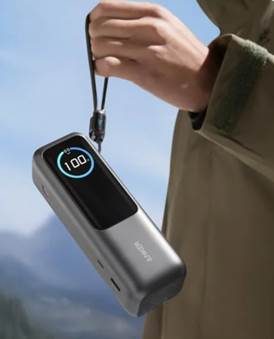Traveling often means
juggling multiple devices that demand power when outlets are scarce, including your smartphones, tablets, cameras, or even laptops. A reliable power
bank transforms this challenge into convenience, ensuring you stay connected,
entertained, and productive on the go. However, not every portable charger is
fit for travel. The difference between a standard power bank and one designed
specifically for mobility lies in key features that prioritize portability,
performance, and safety. In this article, let’s explore what truly defines a
travel-ready power bank and why choosing the right one matters.

Key Features That Define a Travel-Ready Power Bank
Not all portable
chargers are built equally. A power bank portable charger that’s ideal for travel should combine capacity, speed, size, and
safety, all while meeting airline regulations.
Compact Yet Powerful Design
For travel, size
matters. A bulky charger may slow you down, but a compact, high-capacity model
like the Anker Prime Power Bank (20K, 200W) balances portability with power.
Measuring just 4.9 inches across, it fits into carry-on bags without
sacrificing performance, making it a perfect companion for frequent flyers or
commuters.
TSA-Approved Capacity
Airline rules restrict
power banks to under 100Wh for carry-on baggage. Many travel-friendly options,
such as the Anker Prime Power Bank (27K, 250W), are designed with a 99.54Wh
rating, so you can take them on board without issues. This ensures
compliance while still offering enough capacity to charge laptops and
smartphones multiple times.
Fast Charging Capabilities
Time is precious when
you’re on the move. Power banks with high-speed outputs, like Anker’s 737 Power
Bank (24K, 140W), can recharge laptops, tablets, and phones at impressive
speeds. Its Power Delivery 3.1 support allows devices to reach 50% charge in under
30 minutes, ensuring you spend less time waiting and more time enjoying your
trip.
Multiple Device Support
A travel-ready power
bank should handle more than one gadget at a time. Multi-port chargers equipped
with two or three USB-C outputs allow you to charge a laptop and phone
simultaneously. This is particularly useful during layovers or in destinations
where outlets are limited, keeping all your devices powered without compromise.
Smart Displays for Peace of Mind
Transparency matters
when you’re far from a wall socket. Many premium travel power banks, including
Anker’s latest Prime lineup, feature smart digital displays showing real-time
charging speeds, input/output levels, and remaining capacity. This lets you plan
your usage effectively, avoiding the stress of running out of power
mid-journey.
Durability and Safety
Travel often exposes
devices to unpredictable environments. That’s why safety systems like Anker’s
ActiveShield™ 2.0 are essential. By monitoring temperature millions of times
per day and regulating output accordingly, these power banks ensure your devices
are safe from overheating or overcharging, whether you’re on
a train, a plane, or at a remote destination.
Lightweight and Ergonomic Build
Finally, a power bank
designed for travel should be lightweight and easy to carry. Models like the
Anker MagGo 10K add extra convenience with wireless Qi2 charging and a built-in
stand, ideal for travelers who want hands-free video calls or streaming during
downtime. Small touches like this make long journeys more comfortable.

Conclusion
A travel-ready power
bank goes beyond capacity—it blends compact design, compliance with airline
rules, fast charging speeds, and multi-device support into one reliable
package. Safety features and smart displays further elevate the experience,
offering travelers peace of mind no matter where their journey takes them. With
options like the Anker Prime 27K or Anker 737 Power Bank, travelers can enjoy portable
energy that’s efficient, safe, and perfectly designed for mobility. Investing
in the right power bank ensures that your devices stay powered, so you can
focus on the adventure ahead.



